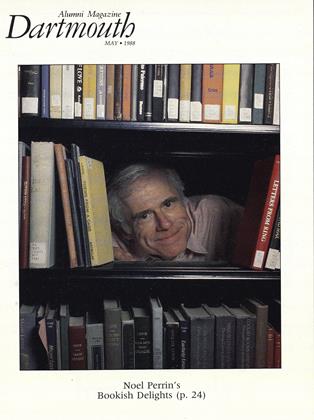Our headline might have been "Paul Boeker '60 involved in international coup." For when this former ambassador and ex-director of the Foreign Service Institute was named president of the Institute of Americas in late February, the chancellor of the University of California at San Diego said, "Getting a man of the stature of Paul Boeker to the IOA is a coup for San Diego and the UCSD community." This independent, private,. nonprofit, and non-partisan organization—dedicated to improving understanding and communication in the Americas—happens to be located at the university.
Other people cheered the appointment, too. Secretary of State George Shultz said, "Paul is one of the Department of State's top career diplomats. [He will] provide strong leadership in the Institute's objective of supporting democracy and strong American ties with the countries of the Pacific Rim and the Hemisphere." And, giving the appointment an appropriate bipartisan spin, former Secretary of State Cyrus Vance said, "Paul is an extraordinarily gifted man who . . . will do well in this important new post."
The leaders of several South American countries chimed in. There were kind words from President Paz of Bolivia, where Boeker was the Carter administration's ambassador from 1977-80, and from Argentina's President Alfonsin. Boeker was also ambassador to Jordan from 1984 until last year, when he joined the U.S. Delegation to the U.N. General Assembly.
Paul Boeker himself had this to say about a new career that builds on his 27 years in the Foreign Service: "My goal is to move the 10A to the forefront of the dialogue on inter-American relations . . . The challenges here center less on geopolitics than on the flows of trade, finance, technology, information, and, most important, political values."
It's interesting to note that Paul—who majored in international relations, worked on The Dartmouth, and graduated magna cum laude—was leaning toward the diplomatic service even when he applied to Dartmouth. Subsequently he studied at Princeton, then won his master's in economics at the University of Michigan. Closing the loop, this internationalist told DAM: "I hope that I can in this new position be helpful to the John Sloan Dickey Endowment from time to time."
 View Full Issue
View Full Issue
More From This Issue
-
 Cover Story
Cover StoryJonathan Corncob and Other Almost Classics
May 1988 By Noel Perrin -
 Feature
FeatureRunning with the Big Boys
May 1988 By Mike Fadil '85 -
 Feature
FeatureAt Dartmouth, the Intellectual Is on the Margin
May 1988 By Karen Avenoso '88 -
 Feature
FeatureDear President Freedman...
May 1988 By Tom Bloomer '53 -
 Article
ArticleAlumni Writers Approve Review's Tongue-Lashing
May 1988 -
 Lettter from the Editor
Lettter from the EditorResponse: The Real Women's Issues
May 1988 By Mary G. Turco
Article
-
 Article
ArticleCamp Counselors
June 1940 -
 Article
ArticleNEW STAFF
OCTOBER 1963 -
 Article
ArticleClub Calendar
April 1981 -
 Article
ArticleCouncil on Diversity report
September 1986 -
 Article
ArticleA Process of Change in the College
April 1937 By EDWARD F. RYAN '37 -
 Article
ArticleEdward Emerson '63: "Hellbent for leather" towards Olympic gold
OCTOBER, 1908 By Harry R. Zlokower '63

